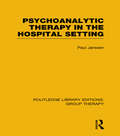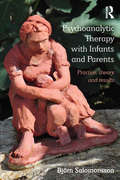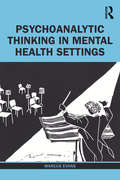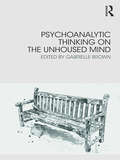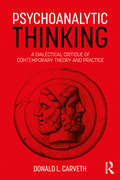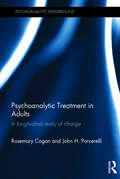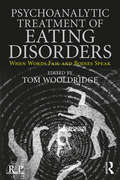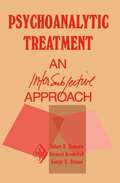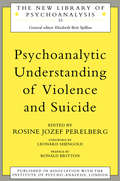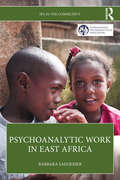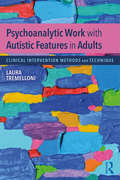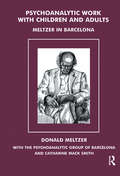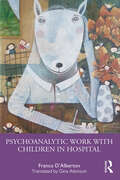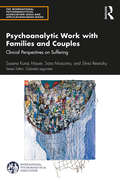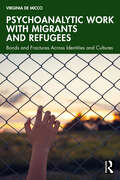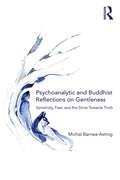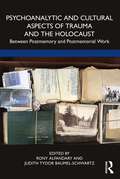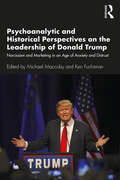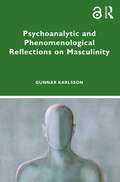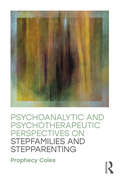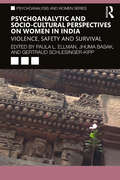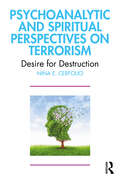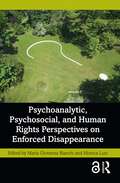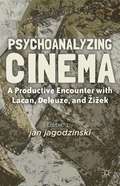- Table View
- List View
Psychoanalytic Therapy in the Hospital Setting (Routledge Library Editions: Group Therapy)
by Paul L. JanssenThough the impetus for psychoanalytic and group-analytic inpatient psychotherapy largely came from Britain, it was in Germany that this work was supported, developed and researched to a greater extent than elsewhere. Originally published in English for the first time in 1994, Paul Janssen describes the different models which had been tried and evaluated and explains his own integrative model in detail, illustrating it with vivid clinical vignettes. The author also shows that inpatient groups are particularly effective in the treatment of severe personality disorders, borderline conditions and psychosomatic illness. This book will still be valuable reading for psychiatrists, psychotherapists, nurses, social workers and anyone working in healthcare today.
Psychoanalytic Therapy with Infants and their Parents: Practice, Theory, and Results
by Björn SalomonssonPsychoanalytic Therapy with Infants and Parents provides a clear guide to clinical psychoanalytic work with distressed babies and unhappy parents, a numerous clinical group so often in need of urgent help. Although psychoanalytic work is primarily verbal, and infants may have limited language, this form of treatment is receiving increased attention among therapists. Björn Salomonsson explores how such work can be possible and benefit infants, how to work with the parents (especially the mother), and how major psychoanalytic concepts such as primal repression, infantile sexuality and transference can be worked with and understood in these therapies. Björn Salomonsson argues that attachment concepts, though important, cannot solely help explain everyday problems with breastfeeding, sleeping, and weaning, or more recalcitrant interaction disorders. He shows how we also need psychoanalytic concepts to better understand, not only such "baby worries", but also adult clients' non-verbal communications and interactions. Throughout, he uses extensive practice-based examples and also refers to his research which provides evidence for the effectiveness of this practice. Psychoanalytic Therapy with Infants and Parents provides a unique perspective on working psychoanalytically with parents and infants. This book will be essential reading for psychoanalysts and therapists working with children as well as adults.
Psychoanalytic Thinking in Mental Health Settings
by Marcus EvansThis book demonstrates the use of psychoanalytic thinking in front-line mental health settings and aims to make an approach to working with emotional and mental disturbance available to a wide range of clinicians within psychiatric and other mental health settings. Rooted in the author’s extensive clinical experiences, the approach explored in this book applies psychoanalytic thinking and discusses this in relation to the mental health conditions regularly encountered in psychiatric settings, such as Schizophrenia, Manic Depression, Psychotic Depression, Anorexia, Deliberate Self Harm, and Personality Disorder. The book therefore provides valuable and practical ways of working with these difficult, complex, and problematic conditions. It further makes sense of the relationships and emotions encountered when working in these settings and introduces possibilities for more effective and rewarding ways of working, including a model of support through supervision, reflective practice, and clinical discussion. Illustrated by clinical examples from more than four decades of experience in the field, this book is ideal for the interested mental health practitioner.
Psychoanalytic Thinking on the Unhoused Mind
by Gabrielle BrownPsychoanalytic Thinking on the Unhoused Mind illuminates the psychological underpinnings of current societal problems: homelessness, mental distress, loneliness and states of societal breakdown and exclusion. Illustrated with a broad range of clinical work as well as thoughts on art and literature, the book brings to life complex tensions between the individual psyche, the group, and wider political and cultural structures. ‘Unhoused’ states of mind are explored in rough sleepers, ex-prisoners, survivors of institutional abuse and family trauma, and people living with personality disorder, addiction, psychosis and dementia. Chapters describe outreach, assessment and long-term psychotherapy, as well as reflective practice with staff teams and care systems, and learning from consultation, supervision and policy development. New therapeutic responses to chronic risk and to resilience are developed from psychoanalytic understandings of difficulties with containment and care. The collection will be of value to psychotherapists and other mental health practitioners, as well as those working in therapeutic, residential and criminal justice settings and outreach services.
Psychoanalytic Thinking: A Dialectical Critique of Contemporary Theory and Practice (Psychological Issues)
by Donald L. CarvethA video of Don Carveth discussing the book and its subject matter can be accessed using the following web URL: https://www.youtube.com/watch?v=yW7tGq0uEtU Since the classical Freudian and ego psychology paradigms lost their position of dominance in the late 1950s, psychoanalysis became a multi-paradigm science with those working in the different frameworks increasingly engaging only with those in the same or related intellectual "silos." Beginning with Freud’s theory of human nature and civilization, Psychoanalytic Thinking: A Dialectical Critique of Contemporary Theory and Practice proceeds to review and critically evaluate a series of major post-Freudian contributions to psychoanalytic thought. In response to the defects, blind spots and biases in Freud’s work, Melanie Klein, Wilfred Bion, Jacques Lacan, Erich Fromm, Donald Winnicott, Heinz Kohut, Heinrich Racker, Ernest Becker amongst others offered useful correctives and innovations that are, nevertheless, themselves in need of remediation for their own forms of one-sidedness. Through Carveth’s comparative exploration, readers will acquire a sense of what is enduringly valuable in these diverse psychoanalytic contributions, as well as exposure to the dialectically deconstructive method of critique that Carveth sees as central to psychoanalytic thinking at its best. Carveth violates the taboo against speaking of the Imaginary, Symbolic and the Real unless one is a Lacanian, or the paranoid-schizoid and depressive positions unless one is a Kleinian, or id, ego, superego, ego-ideal and conscience unless one is a Freudian ego psychologist, and so on. Out of dialogue and mutual critique, psychoanalysis can over time separate the wheat from the chaff, collect the wheat, and approach an ever-evolving synthesis. Psychoanalytic Thinking: A Dialectical Critique of Contemporary Theory and Practice will be of great interest to psychoanalysts and psychoanalytic psychotherapists and, more broadly, to readers in philosophy, social science and critical social theory.
Psychoanalytic Treatment in Adults: A longitudinal study of change (Psychoanalytic Explorations)
by Rosemary Cogan John H. PorcerelliThe outcomes of psychoanalysis, as with other psychotherapies, vary considerably. Psychoanalytic Treatment in Adults examines the results of a longitudinal study of change during psychoanalysis, illuminating the characteristics of patients, analysts and analyses which can help to predict outcomes of treatment. Written by experienced psychologists and psychoanalysts, chapters in the book draw upon sixty case studies to consider how patients with very different analytic outcomes respond at both the beginning and end of their analysis. Psychoanalysts used a clinician report measure, the Shedler-Westen Assessment Procedure, to describe a patient at the beginning of psychoanalysis and every six months until the analysis ended. This allowed the authors to learn about changes over analysis and, in turn, improved treatment planning and practice for the well-being of other patients. Chapters explore five outcomes: a negative therapeutic reaction; attrition when the patient drops out; attrition due to external events; mutual agreement between patient and analyst without maximum benefits; and mutual agreement between patient and analyst with maximum benefits. The findings from these chapters will be of interest to researchers and academics in the fields of psychoanalysis, psychotherapy, psychodynamic therapy, psychoanalytic education, psychiatry and psychology. The results should also help clinicians recognize potential problems early in analytic treatments so that they can work more effectively with patients.
Psychoanalytic Treatment of Eating Disorders: When Words Fail and Bodies Speak (Relational Perspectives Book Series)
by Tom WooldridgePsychoanalytic Treatment of Eating Disorders: When Words Fail and Bodies Speak offers a compilation of some of the most innovative thinking on psychoanalytic approaches to the treatment of eating disorders available today. In its recognition of the multiple meanings of food, weight, and body shape, psychoanalytic thinking is uniquely positioned to illuminate the complexities of these often life-threatening conditions. And while clinicians regularly draw on psychoanalytic ideas in the treatment of eating disorders, many of the unique insights psychoanalysis provides have been neglected in the contemporary literature. This volume brings together some of the most respected clinicians in the field and speaks to the psychoanalytic conceptualization and treatment of eating disorders as well as contemporary issues, including social media, pro-anorexia forums, and larger cultural issues such as advertising, fashion, and even agribusiness. Drawing on new theoretical developments, several chapters propose novel models of treatment, whereas others delve into the complex convergence of culture and psychology in this patient population. Psychoanalytic Treatment of Eating Disorders will be of interest to all psychoanalysts and psychotherapists working with this complex and multi-faceted phenomenon.
Psychoanalytic Treatment: An Intersubjective Approach (Psychoanalytic Inquiry Book Series)
by Robert D. Stolorow George E. Atwood Bernard BrandchaftPsychoanalytic Treatment: An Intersubjective Approach fleshes out the implications for psychoanalytic understanding and treatment of adopting a consistently intersubjective perspective. In the course of the study, the intersubjective viewpoint is demonstrated to illuminate a wide array of clinical phenomena, including transference and resistance, conflict formation, therapeutic action, affective and self development, and borderline and psychotic states. As a consequence, the authors demonstrate that an intersubjective approach greatly facilitates empathic access to the patient's subjective world and, in the same measure, greatly enhances the scope and therapeutic effectiveness of psychoanalysis. Psychoanalytic Treatment is another step in the ongoing development of intersubjectivity theory, as born out in Structures of Subjectivity (1984), Contexts of Being (1992), and Working Intersubjectively (1997), all published by the Analytic Press
Psychoanalytic Understanding of Violence and Suicide (The New Library of Psychoanalysis)
by Rosine Jozef PerelbergAlthough there is a vast literature on aggression, comparatively little has been written on the issue of violence and even fewer clinical discussions have been published on the violent patient. This pioneering book presents a collection of case studies on the intensive psychoanalytic treatment of patients who have committed serious acts of violence against themselves or others. Each detailed clinical account demonstrates the effectiveness of the psychoanalytic treatment and furthers our understanding of the nature of violence. The Psychoanalytic Understanding of Violence and Suicide also contains a comprehensive review of the existing literature on aggression and violence from America, England and France, presenting major themes contained in this literature which will be of interest to all those working with violent and suicidal patients.
Psychoanalytic Work in East Africa (IPA in the Community)
by Barbara SaegesserPsychoanalytic Work in East Africa presents a unique insight into psychoanalytic practice with urban populations in Eastern Africa.Barbara Saegesser describes her psychoanalytic work in different East African locations and in a wide range of contexts. Each chapter considers a particular context, from work in general hospitals and psychiatric hospitals and with children in orphanages, to maternity wards with women who have been subjected to genital mutilation. Saegesser reflects on questions of gender, religion and working across cultures throughout, and considers the benefits of this approach for people who have not previously encountered psychoanalysis.Psychoanalytic Work in East Africa will be of great interest to psychoanalysts and psychoanalytic psychotherapists looking to learn more about working with people in complex, challenging or dangerous situations, across cultures, and in areas where psychoanalysis is not at all known.
Psychoanalytic Work with Autistic Features in Adults: Clinical Intervention Methods and Technique
by Laura TremelloniPsychoanalytic Work with Autistic Features in Adults deals with the diagnostic and therapeutic difficulties of working with patients with autistic residuals, formed in early life experiences that have remained dormant in the unconscious mind. Laura Tremelloni traces the process of identifying them in adult patients, and stresses the need to develop a treatment plan suitable for this kind of pathology. This book uses clinical cases to examine the difficulties of work with hard to reach adults with 'gaps' in their sense of Self and symptoms related to primitive experiences of "non-being". Tremelloni presents new, adaptive therapeutic intervention methods for overcoming such obstacles and identifies the personification and permanence of undeveloped parts of the Self, in hard to reach adults who have otherwise developed satisfactorily and would not be diagnosed as autistic. In such cases, the author suggests the need for clinicians to adapt classic psychoanalytic approaches to the alternating levels of development of the separate parts which the Self has broken into. Psychoanalytic Work with Autistic Features in Adults will help clinicians in psychoanalysis and psychoanalytic psychotherapy to more effectively reach such patients, whilst attempting to address the problematic limitations of therapeutic techniques in very difficult clinical cases.
Psychoanalytic Work with Children and Adults: Meltzer in Barcelona
by Donald MeltzerThis volume is a collection of seminars and lectures the author gave to the Psychoanalytic Group of Barcelona under Dr Leon Grinberg, and later Dr Benito Lopez, during his visit to Barcelona. The clinical case studies outlined in the book address with typical variety the author's thoughts on clinical work with children and adults, and the numerous issues involved therein, including depression, jealousy, delusional omnipotence and perversion.
Psychoanalytic Work with Children in Hospital
by Franco D'AlbertonPsychoanalytic Work with Children in Hospital presents the experiences of a psychoanalyst working within a hospital paediatric department. It explores the possibilities for applying psychoanalytic theory when working with children in hospital and how it can be extended to include parents, caregivers, health care staff and volunteers. Each chapter of the book addresses an issue or area of professional experience that presented Franco D’Alberton with clinical or technical questions, outlining the core concern and then exploring his attempt to provide answers to these questions. This volume presents many possible applications of psychoanalytic theory in a paediatric hospital, encompassing issues encountered by health care staff and volunteers as well as by parents and their hospitalized children, such as physical pain, meetings and information sharing and group settings. It also describes therapeutic interventions directed towards both children and parents. This book will be key reading for child and adolescent psychoanalysts, psychotherapists, and clinical psychologists in practice and in training. It will also interest clinicians seeking to understand how psychoanalytic work can be applied in hospital and health care settings.
Psychoanalytic Work with Families and Couples: Clinical Perspectives on Suffering (The International Psychoanalytical Association Psychoanalytic Ideas and Applications Series)
by Susana Kuras Mauer Sara Moscona Silvia ResnizkyPsychoanalytic Work with Families and Couples rethinks the ways in which conflicts present today in psychoanalytic consulting rooms and the nature of suffering in family, couple, and sibling bonds. Based on two major concepts, that of device (drawn from the philosophers Foucault, Deleuze, and Agamben) and that of link (developed by Berenstein and Puget), the authors have developed new approaches to clinical practice with families and couples that focus on the complexity, singularity, and immanence of patient-analyst interaction in the session. In thinking about link dynamics, moreover, they go beyond the consulting room to reflect on how these dynamics develop in other spaces, such as institutions, organizations, and the fraternal circle of colleagues. Part I, Couples and Families Today, discusses changes undergone by families and couples in the last thirty years and their effects on psychoanalytic practice. Attributing a link logic to suffering and to the situations that condition it implies making significant decisions regarding our clinical strategy, our choice of a device and of an interpretive path. Faithful to the idea that the clinical dimension calls for transformations, the second part, Facing Clinical Challenges, includes clinical materials from manifold treatment devices that attest to changes both in contemporary paradigms and in the professional lives of psychoanalysts. Psychoanalytic Work with Families and Couples will be of great interest to all practicing psychoanalysts and psychoanalytic psychotherapists.
Psychoanalytic Work with Migrants and Refugees: Bonds and Fractures Across Identities and Cultures
by Virginia De MiccoPsychoanalytic Work with Migrants and Refugees presents a rich panorama of the clinical issues facing those who experience migration. Thorough and empathetic in its approach, this book considers the potentially devastating impact of migration on one’s sense of personal and cultural identity, using clinical vignettes from reception centres to illustrate the experience of both adult and adolescent migrants. Virginia De Micco looks at the transgenerational impact migration can have on psychic development and child-parent relationships, both on a socio-anthropological and an unconscious level. She highlights the unique migratory experience of both women and mothers, equipping readers with the tools to deal with the grief and guilt that can arise in these nuanced situations. Adopting an anthropological approach, De Micco also considers the irrevocable impact of migration on the host country, looking both at the reaction of those who live in the receiving countries as well as the broader impact of multiculturalism and globalisation. Throughout, the book offers a deep, fundamental understanding of the psychic conditions and reactions of people receiving migrants, with a view to avoiding cultural misunderstandings and bias and improving the integration process. This book is an essential manual for psychoanalysts and psychologists working with migrants and refugees, as well as social workers and care workers based in reception centres and other institutions dealing with migrants.
Psychoanalytic and Buddhist Reflections on Gentleness: Sensitivity, Fear and the Drive Towards Truth
by Michal Barnea-AstrogInspired by Buddhist teachings and psychoanalytic thought, this book explores gentleness as a way of being and a developmental achievement. It offers reflections on the unique position of "gentle people", as well as certain gentle layers of the psyche in general, as they meet the world. Examining the perceptual-sensory-conscious discrepancy that often exists between a gentle person and their surroundings, it follows the intricate relationship between sensitivity and fear, the need for self-holding, and the possibility of letting go. Incorporating theoretical investigation, clinical vignettes, and personal contemplation, the book looks into those states of mind and qualities of attention that may compose a favorable environment, internal and interpersonal, where gentleness can be delicately held. There, it is suggested, gentleness may gradually shed the fragility, confusion, and destructiveness that often get entangled with it, and serve as a valuable recourse. Offering a unique perspective on a topic rarely discussed, the book has broad appeal for both students and practitioners of psychoanalysis and psychotherapy, as well as Buddhist practitioners and scholars.
Psychoanalytic and Cultural Aspects of Trauma and the Holocaust: Between Postmemory and Postmemorial Work
by Rony Alfandary Judith Tydor Baumel-SchwartzPsychoanalytic and Cultural Aspects of Trauma and the Holocaust presents interdisciplinary postmemorial endeavors of second-, third- and fourth-generation Holocaust survivors living in Israel and in the Jewish diaspora. Drawing on a wide range of fields, including psychoanalysis, Holocaust studies, journal and memoir writing, hermeneutics, and the arts, this book considers how individuals dealing with the memory, or postmemory, of the Holocaust possess a personal connection to this trauma. Exploring their role as testimony bearers, each contributor performs their postmemorial work in a unique and creative way, blending the subjective and the objective. The book considers themes including postcolonialism, home, displacement, and identity. Psychoanalytic and Cultural Aspects of Trauma and the Holocaust will be key reading for academics and students of psychoanalytic studies, Holocaust studies, and trauma and cultural studies. It will also be of interest to psychoanalysts working with transgenerational trauma.
Psychoanalytic and Historical Perspectives on the Leadership of Donald Trump: Narcissism and Marketing in an Age of Anxiety and Distrust
by Michael MaccobyWhat is Donald Trump’s personality? Is he mentally ill? What in American culture and history enabled him to become president? How does his personality shape his policies and leadership? In this fascinating and highly relevant new book, these questions are answered by a selection of expert contributors, including psychoanalysts, historians, and a sociologist. Narcissism is defined and applied to Donald Trump, his personal history and style of leadership, and the relationship between Trump and his base is explored as a symptom of his needs and the needs of his followers. U.S. culture and U.S. politics are put under the lens, as chapters draw on contemporary academic and journalistic analysis, continuing discussions around gaslighting, demagoguery, and fascism in terms of their validity in application to Trump. Psychoanalytic and Historical Perspectives on the Leadership of Donald Trump refutes many of the mental health experts who label Trump as suffering from a narcissistic personality disorder and makes the case that Trump’s personality combines a marketing and narcissistic orientation that determines his behavior and policies. The authors also assert that to understand Trump’s rise and his followers, it is valuable to combine psychoanalytic, historical, and sociological perspectives. This book will therefore be of great interest to academics in those fields and all those with an interest in contemporary American politics.
Psychoanalytic and Phenomenological Reflections on Masculinity
by Gunnar KarlssonIn this highly original volume, Gunnar Karlsson offers new answers to the question concerning the relationship between belonging to a specific sex as a male and striving for a masculine identity. This book offers a uniquely psychoanalytic and phenomenological perspective on masculinity. Karlsson considers masculinity and traditional masculine ideals through a psychoanalytic lens before taking phenomenological concepts to chisel out the relationship between sex and gender. This perspective is developed throughout the volume to inspire readers to further their understanding of traditional gender assignment – female, male and intersex – in light of gendered characteristics such as femininity and masculinity. Chapters span topics such as the characteristics of typical, so-called “phallic masculinity”, its allure and psychogenetic explanation, as well as looking at what phallic masculinity disregards. Throughout, Karlsson maintains that phallic masculinity is unattainable, as it seeks to escape the existential conditions of helplessness, vulnerability, and dependence. He makes the case for the importance of considering the notion of ego-identity in the field of sex/gender studies, encouraging a liberation from gender stereotypes. Psychoanalytic and Phenomenological Reflections on Masculinity will be of great interest to researchers, clinical psychoanalysts and psychotherapists, as well as anyone interested in masculinity, gender studies and the relationship between sex and gender.
Psychoanalytic and Psychotherapeutic Perspectives on Stepfamilies and Stepparenting
by Prophecy ColesPsychoanalytic and Psychotherapeutic Perspectives on Step-families and Step-parenting looks at the role step-parents can play in the psychic development of children. Step-parenting requires enormous confidence and resilience that stretches into a territory of human emotions and conflict that can make marriage seem easy. Prophecy Coles’ concern has been that we are witnessing a new kinship system and our psychological thinking has not kept up with the emotional effect that stepparents are having upon the next generation. The author traces the history of our beliefs about stepparents through the oral tradition of the fairy story into our present, arguably prejudiced beliefs about them. Coles explores whether our feelings about stepparents arise from the unconscious tradition that placed stepparents in hostile opposition to the natural forces of parenting. The absence of detailed clinical work on the subject has meant that the author has drawn on interviews, biography and three long term research projects to think about this new family constellation. Covering such topics as the prevalence and importance of step-mothers historically, the reasons for psychoanalytic neglect of this subject, and using clinical material drawn from work with step-mothers, children and fathers, this is a much-needed guide to working with families affected by maternal loss and alternative parenting roles. It will encourage a further appreciation of the psychological difficulties that stepparents face, and at the same time offer a re-appraisal of the pain that young children go through when their parents decide to separate. Psychoanalytic and Psychotherapeutic Perspectives on Step-families and Step-parenting will appeal greatly to psychoanalysts and psychoanalytic psychotherapists.
Psychoanalytic and Socio-Cultural Perspectives on Women in India: Violence, Safety and Survival (Psychoanalysis and Women Series)
by Paula L. EllmanThis important book provides a bridge between psychoanalytic perspectives and socio-cultural issues to shine a spotlight on the experiences of women in India today. Women’s well-being and security has often depended upon their gender positioning while other binaries like rural-urban, class, and caste have also played a crucial role globally and especially in India. Historically, women have been subjected to various forms of oppression that include sex selective abortions, domestic violence, bride burning for dowry, and acid attacks. Threats to women’s security have recently increased with progressive polarization and hardening of socio-political and cultural ideologies. This book assesses how women’s lives are impacted by these social and cultural conventions and stigma, including ideas around motherhood, religion, intimacy and femininity itself, and the psychological implications these have. Topics include the seduction of religion, motherhood in contemporary times, intimacy and violence, and fundamentalist states of mind in the clinical space. While the book echoes a regional specificity, it simultaneously resonates a backdrop of global change of affairs that has its impact on ideological freedom and the concept of inclusivity in terms of gender, race, culture, and politics across the world. For this comprehensive perspective, the effort is to create a platform of authors comprising psychoanalysts, social scientists, scholars from the liberal arts discipline, as well as social activists. In a country where women have been historically subjected to both psychological and physical oppression, this timely and original book will interest a range of scholars interested in gender, mental health and contemporary Indian society, as well as clinicians in the field.
Psychoanalytic and Spiritual Perspectives on Terrorism: Desire for Destruction
by Nina E. CerfolioNina E. Cerfolio masterfully explores the deeper spiritual and psychoanalytic understanding of the origins of human aggressive and destructive instincts which underlie mass shootings and terrorism. The author survived two terrorist attacks: developing breast cancer from being a first responder at 9/11, and being poisoned by an FSB agent while providing humanitarian aid in the Second Chechen War. Through a personal, scholarly investigation into her psyche, the author describes the spiritual awakening that was catalyzed by these events and their traumatic impact, and examines how a world could create the firmament for the kinds of destructive aggression that are a daily occurrence. Featuring cutting-edge quantitative research and case material, which illustrates the prevalence of undiagnosed and untreated psychiatric illness among mass shooters and terrorists, this book encourages dialogue about the stigma of mental illness and challenges the perception of terrorists as monsters with no societal responsibility. Championing the forgotten collective humiliation of the marginalized—which in turn breeds terrorism—and documenting a new spiritual lens through which healing is possible, this book will be essential reading for mental health workers and anyone wishing to understand the traumatizing epoch in which we are living.
Psychoanalytic, Psychosocial, and Human Rights Perspectives on Enforced Disappearance
by Maria Giovanna BianchiCollecting authoritative contributions, Psychoanalytic, Psychosocial, and Human Rights Perspectives on Enforced Disappearance combines the life experience of victims with the expertise of scholars and practitioners of human rights, psychoanalysis, and artists to compose a picture that renders the complexity of this crime in its legal, psychological, and social aspects. Victims offer a glimpse into the bottomless despair of those who lose a family member in such a dramatic and torturous way. Academic scholars give a picture of this crime in contemporary world. Experts in human rights law address the progress and limitations of the different standards applied in international human rights law. The psychosocial framework in the context of forensic investigations and reparations encourages the decision-making process of the victims and the elaboration of their personal and collective stories. Psychoanalytic authors address the problems of perpetrators' states of mind, the profound psychological and unconscious significance of torture and the disappearance of people by the State, and the issues of memory and trauma in its multiple meanings, individual, collective, and transgenerational. Art is part of this collective effort to work through, to question, to understand and repair the damages of evil. The book is aimed at postgraduate students, scholars, and practitioners in politics, psychoanalysis, law, psychology, psychosocial studies, human rights, social work and justice, and related fields.
Psychoanalytically Informed Play Therapy: Fantasy-Exposure Life-Narrative Therapy
by Jason L. SteadmanPsychoanalytically Informed Play Therapy: Fantasy-Exposure Life-Narrative Therapy is a structured manual for the execution of FELT, an integrative play therapy that marries the analytic, relational, and psychodynamic aspects of traditional Play Therapy with the scientific rigor and replicability standards of clinical empiricism.Jason Steadman’s FELT model creates a structured, empirically derived means of monitoring children’s play using psychoanalytic methods. Steadman’s method proposes the usage of story stems to structure play to address critical needs in children’s psychological development. In FELT, Steadman teaches readers how to identify problematic play themes and how to respond therapeutically to drive play and general child development toward healthy directions. Steadman uses anxiety as the primary example of psychological distress for FELT, but also shows how the method can be applied to many other pathologies, such as depression and trauma. Steadman explains 11 core FELT themes, which are then further condensed to three major clinical targets identified in the play of clinically anxious children. Each of these is described in detail in the book and therapists are shown not only how to reliably identify themes, but how to focus their interventions to move children toward major play-based targets. Integrating psychoanalytic theory with an emphasis on Object Relations, Steadman’s FELT program highlights the importance of the self in healthy child development and how play-based psychotherapy can be used to help children build stronger, healthier selves that can face a wide variety of psychological issues across their lifespan.Including comprehensive theoretical underpinnings and thorough clinical examples of FELT at work, this volume will allow therapists, clinicians, and mental health workers to understand childhood play in an empirically based manner and show them how to integrate the key tenets of FELT into their own work to better aid children experiencing anxiety and other mental health concerns.
Psychoanalyzing Cinema
by Jan JagodzinskiThe essays within this collection explore the possibilities and potentialities of all three positions, presenting encounters that are, at times contradictory, at other times supportive, as well as complementary. The collection thereby enriches the questions that are being raised within contemporary cinematic studies.
